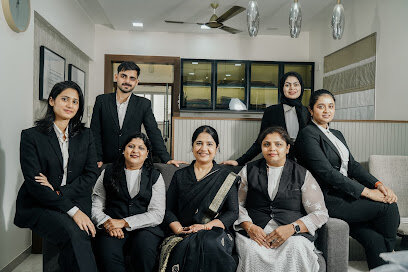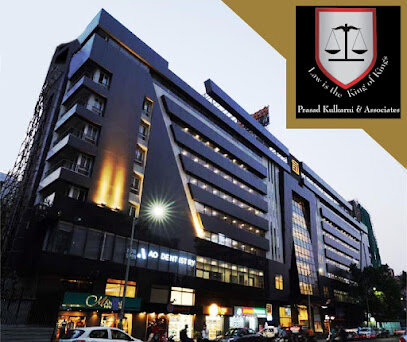Best Native People Lawyers in Pune
Share your needs with us, get contacted by law firms.
Free. Takes 2 min.
List of the best lawyers in Pune, India
About Native People Law in Pune, India
Native people, often referred to as indigenous or tribal communities, have a unique legal status in India. Pune, located in the state of Maharashtra, has a rich history and a diverse population that includes several native communities. These communities have specific legal protections and rights under Indian law to preserve their culture, land, and way of life.
Why You May Need a Lawyer
There are several situations where native people in Pune might require legal assistance:
- Land Rights: Issues related to ownership, transfer, and protection of ancestral lands.
- Cultural Preservation: Legal measures to protect cultural heritage, practices, and languages.
- Government Schemes: Guidance on accessing benefits from various government programs targeted at native communities.
- Discrimination and Rights Violations: Legal recourse in cases of discrimination, exploitation, or violation of rights.
- Business and Employment: Navigating legal requirements for starting businesses or seeking employment while preserving traditional ways.
Local Laws Overview
Several key aspects of local laws in Pune and Maharashtra greatly impact native people:
The Scheduled Tribes and Other Traditional Forest Dwellers (Recognition of Forest Rights) Act, 2006 (FRA): This law recognizes the rights of tribal communities and other traditional forest dwellers to forest resources they have been dependent on for generations.
The Panchayats (Extension to Scheduled Areas) Act, 1996 (PESA): PESA aims to extend the provisions of Part IX of the Constitution relating to the Panchayats to the Scheduled Areas, ensuring local self-governance through traditional Gram Sabhas.
The Maharashtra Transfer of Ownership of Lands Act: This act restricts the transfer of land belonging to tribal communities to non-tribal individuals to prevent exploitation and ensure the preservation of tribal land.
Frequently Asked Questions
What legal protections do native people have in Pune?
Native people in Pune are protected under various national and state laws, including the Forest Rights Act and provisions in the Indian Constitution aimed at safeguarding their cultural, economic, and social rights.
How can a native person reclaim their ancestral land?
A native person can reclaim ancestral land by proving their historical and traditional ownership or occupancy through legal documentation and testimonies under the guidelines of the Forest Rights Act.
What is the process for accessing government benefits for native people?
Native people can access government benefits by registering with local government offices and proving their tribal status through official documentation like tribal certificates.
How can a native community preserve its cultural heritage legally?
Legal measures include registering cultural practices and sites with government authorities, seeking assistance from cultural organizations, and leveraging laws like PESA to enforce local governance.
What should I do if I face discrimination as a native person?
You should report the discrimination to local authorities, seek legal counsel, or contact organizations dedicated to the protection of tribal rights for support and advocacy.
Can native people start businesses in Pune?
Yes, but they may need to navigate specific legal requirements and benefit from schemes designed to promote entrepreneurship among native communities.
How does the government ensure the protection of native lands?
The government enforces laws that restrict the transfer and exploitation of tribal lands while recognizing traditional occupancy and use through acts like the FRA.
Are there any specific laws for native women in Pune?
While general provisions apply, various schemes and protections are in place to support and protect the rights of native women, including those aimed at preventing domestic violence and promoting education and employment.
What is PESA, and how does it impact native communities?
PESA extends the provisions of local self-governance to scheduled areas, ensuring that native communities have control over administrative and developmental activities through traditional Gram Sabhas.
How can native people participate in the local governance system?
Native people can participate through Gram Sabhas, which play a crucial role in self-governance and decision-making in scheduled areas as provided under PESA.
Additional Resources
Here are some helpful resources and organizations:
- Ministry of Tribal Affairs: The central government body responsible for formulating policies and programs for the development of tribal communities.
- State Tribal Development Department: A state-level body in Maharashtra dedicated to the welfare of native people.
- Non-Governmental Organizations (NGOs): Various NGOs work for the rights and upliftment of tribal communities, providing legal aid, education, and social services.
- National Commission for Scheduled Tribes (NCST): A constitutional body established to protect the interests of scheduled tribes.
Next Steps
If you need legal assistance regarding native people in Pune, you can take the following steps:
- Contact a lawyer who specializes in native people's law and has experience with local issues in Pune.
- Consult with NGOs or community organizations that work with native people.
- Reach out to the Ministry of Tribal Affairs or the State Tribal Development Department for guidance and support.
- Participate in local governance structures like Gram Sabhas to ensure your voice is heard and your rights are protected.
Lawzana helps you find the best lawyers and law firms in Pune through a curated and pre-screened list of qualified legal professionals. Our platform offers rankings and detailed profiles of attorneys and law firms, allowing you to compare based on practice areas, including Native People, experience, and client feedback.
Each profile includes a description of the firm's areas of practice, client reviews, team members and partners, year of establishment, spoken languages, office locations, contact information, social media presence, and any published articles or resources. Most firms on our platform speak English and are experienced in both local and international legal matters.
Get a quote from top-rated law firms in Pune, India — quickly, securely, and without unnecessary hassle.
Disclaimer:
The information provided on this page is for general informational purposes only and does not constitute legal advice. While we strive to ensure the accuracy and relevance of the content, legal information may change over time, and interpretations of the law can vary. You should always consult with a qualified legal professional for advice specific to your situation.
We disclaim all liability for actions taken or not taken based on the content of this page. If you believe any information is incorrect or outdated, please contact us, and we will review and update it where appropriate.











